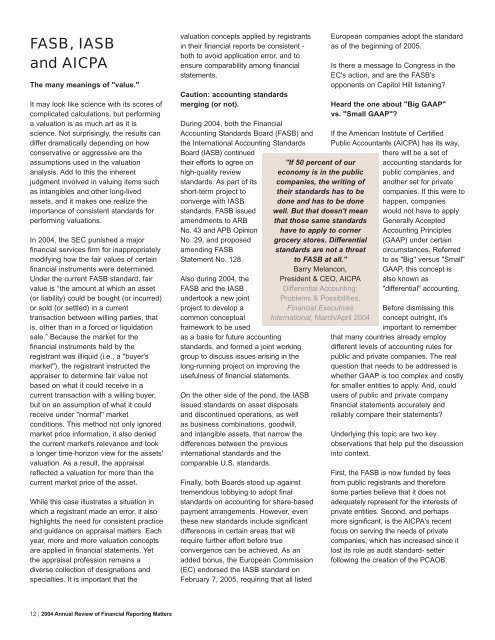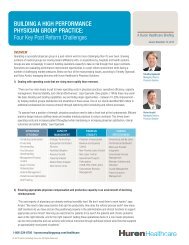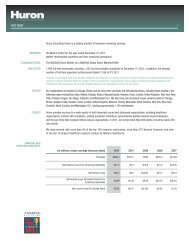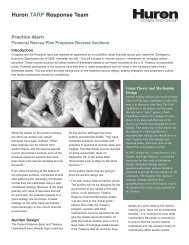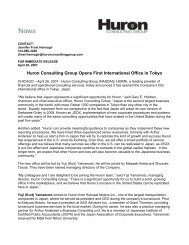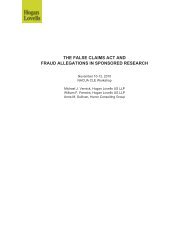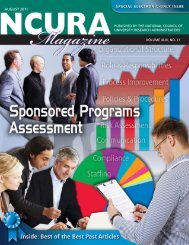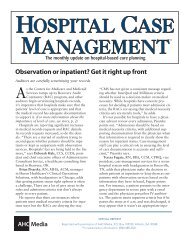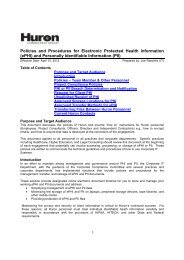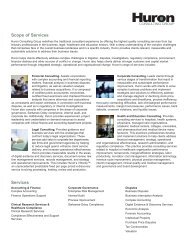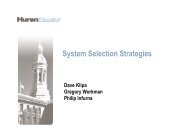2004 Annual Review of Financial Reporting Matters - Huron ...
2004 Annual Review of Financial Reporting Matters - Huron ...
2004 Annual Review of Financial Reporting Matters - Huron ...
Create successful ePaper yourself
Turn your PDF publications into a flip-book with our unique Google optimized e-Paper software.
FASB, IASB<br />
and AICPA<br />
The many meanings <strong>of</strong> "value."<br />
It may look like science with its scores <strong>of</strong><br />
complicated calculations, but performing<br />
a valuation is as much art as it is<br />
science. Not surprisingly, the results can<br />
differ dramatically depending on how<br />
conservative or aggressive are the<br />
assumptions used in the valuation<br />
analysis. Add to this the inherent<br />
judgment involved in valuing items such<br />
as intangibles and other long-lived<br />
assets, and it makes one realize the<br />
importance <strong>of</strong> consistent standards for<br />
performing valuations.<br />
In <strong>2004</strong>, the SEC punished a major<br />
financial services firm for inappropriately<br />
modifying how the fair values <strong>of</strong> certain<br />
financial instruments were determined.<br />
Under the current FASB standard, fair<br />
value is “the amount at which an asset<br />
(or liability) could be bought (or incurred)<br />
or sold (or settled) in a current<br />
transaction between willing parties, that<br />
is, other than in a forced or liquidation<br />
sale.” Because the market for the<br />
financial instruments held by the<br />
registrant was illiquid (i.e., a "buyer's<br />
market"), the registrant instructed the<br />
appraiser to determine fair value not<br />
based on what it could receive in a<br />
current transaction with a willing buyer,<br />
but on an assumption <strong>of</strong> what it could<br />
receive under "normal" market<br />
conditions. This method not only ignored<br />
market price information, it also denied<br />
the current market's relevance and took<br />
a longer time-horizon view for the assets'<br />
valuation. As a result, the appraisal<br />
reflected a valuation for more than the<br />
current market price <strong>of</strong> the asset.<br />
While this case illustrates a situation in<br />
which a registrant made an error, it also<br />
highlights the need for consistent practice<br />
and guidance on appraisal matters. Each<br />
year, more and more valuation concepts<br />
are applied in financial statements. Yet<br />
the appraisal pr<strong>of</strong>ession remains a<br />
diverse collection <strong>of</strong> designations and<br />
specialties. It is important that the<br />
valuation concepts applied by registrants<br />
in their financial reports be consistent -<br />
both to avoid application error, and to<br />
ensure comparability among financial<br />
statements.<br />
Caution: accounting standards<br />
merging (or not).<br />
During <strong>2004</strong>, both the <strong>Financial</strong><br />
Accounting Standards Board (FASB) and<br />
the International Accounting Standards<br />
Board (IASB) continued<br />
their efforts to agree on<br />
high-quality review<br />
standards. As part <strong>of</strong> its<br />
short-term project to<br />
converge with IASB<br />
standards, FASB issued<br />
amendments to ARB<br />
No. 43 and APB Opinion<br />
No. 29, and proposed<br />
amending FASB<br />
Statement No. 128.<br />
Also during <strong>2004</strong>, the<br />
FASB and the IASB<br />
undertook a new joint<br />
project to develop a<br />
common conceptual<br />
framework to be used<br />
as a basis for future accounting<br />
standards, and formed a joint working<br />
group to discuss issues arising in the<br />
long-running project on improving the<br />
usefulness <strong>of</strong> financial statements.<br />
On the other side <strong>of</strong> the pond, the IASB<br />
issued standards on asset disposals<br />
and discontinued operations, as well<br />
as business combinations, goodwill,<br />
and intangible assets, that narrow the<br />
differences between the previous<br />
international standards and the<br />
comparable U.S. standards.<br />
Finally, both Boards stood up against<br />
tremendous lobbying to adopt final<br />
standards on accounting for share-based<br />
payment arrangements. However, even<br />
these new standards include significant<br />
differences in certain areas that will<br />
require further effort before true<br />
convergence can be achieved. As an<br />
added bonus, the European Commission<br />
(EC) endorsed the IASB standard on<br />
February 7, 2005, requiring that all listed<br />
"If 50 percent <strong>of</strong> our<br />
economy is in the public<br />
companies, the writing <strong>of</strong><br />
their standards has to be<br />
done and has to be done<br />
well. But that doesn't mean<br />
that those same standards<br />
have to apply to corner<br />
grocery stores. Differential<br />
standards are not a threat<br />
to FASB at all."<br />
Barry Melancon,<br />
President & CEO, AICPA<br />
Differential Accounting:<br />
Problems & Possibilities,<br />
<strong>Financial</strong> Executives<br />
International, March/April <strong>2004</strong><br />
European companies adopt the standard<br />
as <strong>of</strong> the beginning <strong>of</strong> 2005.<br />
Is there a message to Congress in the<br />
EC's action, and are the FASB's<br />
opponents on Capitol Hill listening<br />
Heard the one about "Big GAAP"<br />
vs. "Small GAAP"<br />
If the American Institute <strong>of</strong> Certified<br />
Public Accountants (AICPA) has its way,<br />
there will be a set <strong>of</strong><br />
accounting standards for<br />
public companies, and<br />
another set for private<br />
companies. If this were to<br />
happen, companies<br />
would not have to apply<br />
Generally Accepted<br />
Accounting Principles<br />
(GAAP) under certain<br />
circumstances. Referred<br />
to as "Big" versus "Small"<br />
GAAP, this concept is<br />
also known as<br />
"differential" accounting.<br />
Before dismissing this<br />
concept outright, it's<br />
important to remember<br />
that many countries already employ<br />
different levels <strong>of</strong> accounting rules for<br />
public and private companies. The real<br />
question that needs to be addressed is<br />
whether GAAP is too complex and costly<br />
for smaller entities to apply. And, could<br />
users <strong>of</strong> public and private company<br />
financial statements accurately and<br />
reliably compare their statements<br />
Underlying this topic are two key<br />
observations that help put the discussion<br />
into context.<br />
First, the FASB is now funded by fees<br />
from public registrants and therefore<br />
some parties believe that it does not<br />
adequately represent for the interests <strong>of</strong><br />
private entities. Second, and perhaps<br />
more significant, is the AICPA's recent<br />
focus on serving the needs <strong>of</strong> private<br />
companies, which has increased since it<br />
lost its role as audit standard- setter<br />
following the creation <strong>of</strong> the PCAOB.<br />
12 | <strong>2004</strong> <strong>Annual</strong> <strong>Review</strong> <strong>of</strong> <strong>Financial</strong> <strong>Reporting</strong> <strong>Matters</strong>


